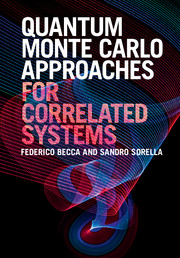Book contents
- Frontmatter
- Contents
- Preface
- Acknowledgements
- Part I Introduction
- Part II Probability and Sampling
- 2 Probability Theory
- 3 Monte Carlo Sampling and Markov Chains
- 4 Langevin Molecular Dynamics
- Part III Variational Monte Carlo
- Part IV Projection Techniques
- Part V Advanced Topics
- Appendix Pseudo-Random Numbers Generated by Computers
- References
- Index
2 - Probability Theory
from Part II - Probability and Sampling
Published online by Cambridge University Press: 17 November 2017
- Frontmatter
- Contents
- Preface
- Acknowledgements
- Part I Introduction
- Part II Probability and Sampling
- 2 Probability Theory
- 3 Monte Carlo Sampling and Markov Chains
- 4 Langevin Molecular Dynamics
- Part III Variational Monte Carlo
- Part IV Projection Techniques
- Part V Advanced Topics
- Appendix Pseudo-Random Numbers Generated by Computers
- References
- Index
Summary
Introduction
By using the laws of classical mechanics, in principle we can make exact predictions of events by knowing the exact initial conditions (i.e., all positions and velocities of the relevant degrees of freedom). However, in practice, there are several events that are unpredictable, essentially because it is impossible to have the exact knowledge of the initial conditions and a very small error in those conditions will grow exponentially in time, invalidating any attempt to follow the exact equations of motion. When tossing a coin or rolling a die, we do not know the outcome of the event, but we can give some probability to each event, e.g., 1/2 for head and 1/2 for tail when tossing a coin, or 1/6 for each side of a die (we assume that we are playing with fair coins and dice). The probability gives the measure of the likelihood that a given event will occur. Of course, it is based upon a mathematical approach, which transforms the unpredictability into something that is somehow predictable.
This idea seems very simple, but it took several hundred years to capture it. Indeed, since the ancient times, people in Greece and in the Roman Empire (but also in Asia, for example, in India) were tenacious gamblers; nevertheless, nobody tried to understand how the random events were related to mathematical laws.Many quarrels and disputes were resolved by tossing a coin, and the result was seen as the manifestation of the “celestial will.” The human superstition represented a huge obstacle to define a scientific (i.e., mathematical) approach to random events. Eventually, after several hundreds of years, superstition was overcome by an even stronger human impulse: the desire of obtaining an economical profit.
The birth of the mathematical theory of probability is due to the studies done by Girolamo Cardano, who realized that for equiprobable events (like tossing a coin or rolling a die), the probability that a single event will appear is equal to 1 over the number of all possible events (independently from any celestial will).
- Type
- Chapter
- Information
- Quantum Monte Carlo Approaches for Correlated Systems , pp. 39 - 55Publisher: Cambridge University PressPrint publication year: 2017



